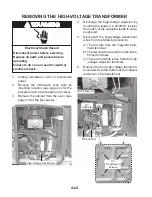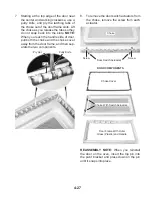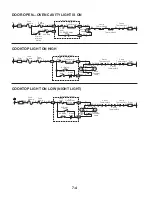
5-6
POWER RESISTOR
Refer to page 4-20 for the procedure for ac-
cessing the power resistor.
1. Unplug microwave oven or disconnect
power.
2. Disconnect one of the wires from the
power resistor terminals.
3. Set the ohmmeter to the R x 1 scale.
4. Touch the ohmmeter test leads to the
filament terminals. The meter should in-
dicate between 37 and 45 Ω.
Electrical Shock Hazard
Disconnect power before servicing.
Replace all parts and panels before operating.
Failure to do so can result in death or electrical shock.
WARNING
HIGH-VOLTAGE DIODE
Refer to page 4-20 for the procedure for ac-
cessing the high-voltage (H.V.) diode.
NOTE:
Some inexpensive ohmmeters do not
have a 9-volt battery incorporated in them, and
may indicate infinite resistance in both directions
when testing the diode. It is recommended that
you use an ohmmeter with a 9-volt battery on
the R x 10 scale to properly test the H.V. diode.
1. Unplug microwave oven or disconnect
power.
2. Discharge the high-voltage capacitor by
touching the leads of a 20,000
Ω
resistor
from each of the capacitor leads to chas-
sis ground.
3. Disconnect the H.V. diode lead from the
high voltage capacitor terminal.
4. For ohmmeters without a 9-volt battery,
prepare the DC 9-volt battery and 10 k
Ω
resistor in series including wire leads.
5. Connect the DC 9-volt battery to the H.V.
diode.
6. Set the ohmmeter to the R x 10K scale.
7. Measure the continuity as follows (values
are approximate):
Forward Direction: Normal: 5 to 6 volts.
•
Abnormal: Open = 9 volts, short = 0
volts.
Reverse Direction: Normal: 9 volts.
•
Abnormal: Open = 9 volts, short = 0 volts.
H.V. diode















































